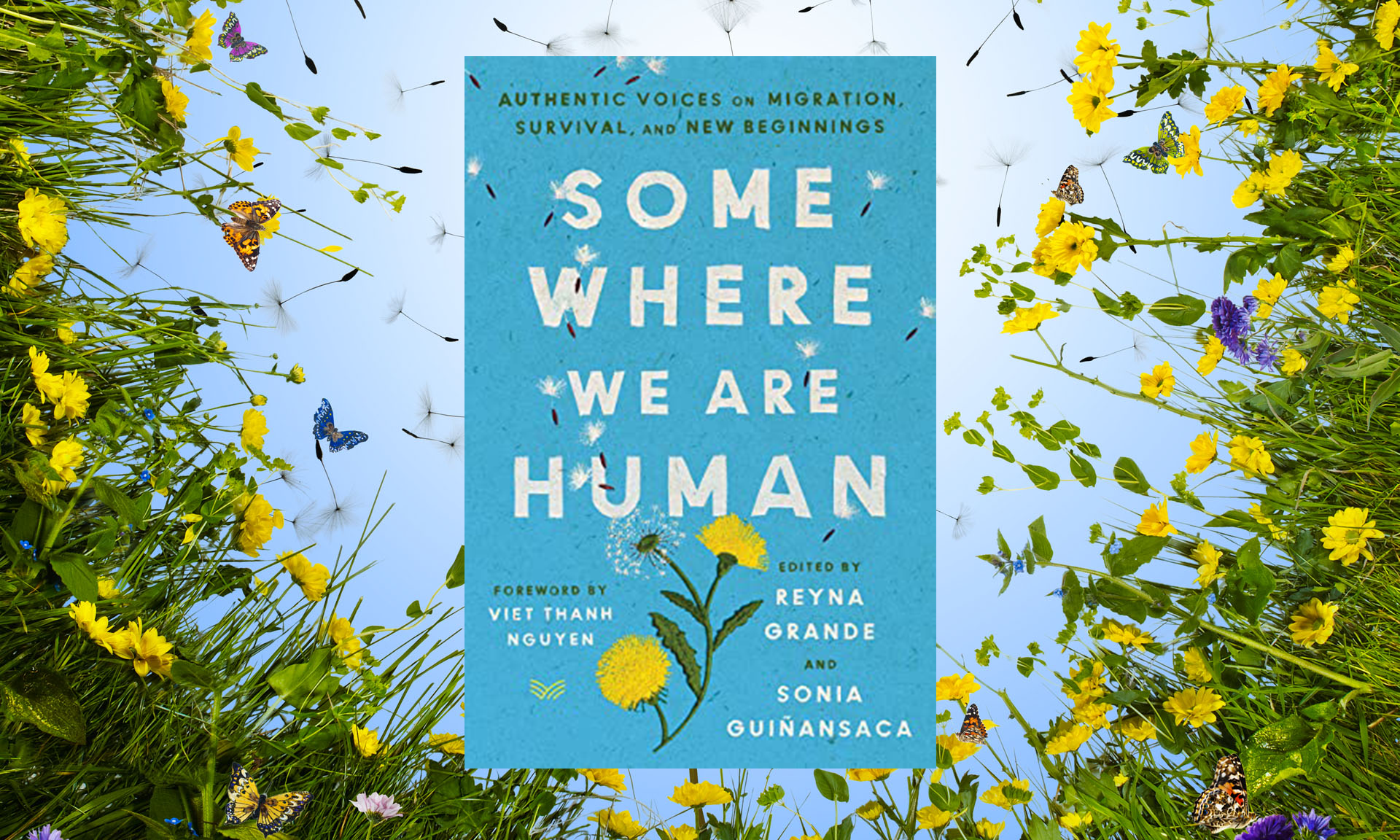I came to Somewhere We Are Human ready to learn. It’s a new anthology created by currently or formerly undocumented people and published by HarperCollins. Curated by Reyna Grande and Sonia Guiñansaca, the entries range from visual art to personal essays (with poetry, arguably, in between), with authors, artists, and curators hail from Latin America, Asia, and Africa (including Julissa Arce). Inherently this book shapes an understanding of immigration usually left out of US textbooks.
Certainly, coming to the US isn’t the fairytale we’ve been sold. Being here doesn’t magically whisk away immigrants’ problems – it replaces them with different ones. The US’s culture, job markets, and government are often hostile institutions, asking for total sacrifice to the US’s own sense of exceptionalism while offering punishing work as the reward.
Somewhere We Are Human explores what it’s really like to be an immigrant – how it feels, tastes, and looks. And the result has a lot of hard truths about the United States, even as it comes from people who have sacrificed a lot to be here.
I am not an immigrant or even the daughter of immigrants. It was my grandparents who came over from Mexico (on my dad’s side, on my mom’s white-European side, the journey was even further back). I remember asking Abuelita about her immigration story for a seventh-grade project. She crossed when she was 14 under a dramatically different system than those coming from Central America today. Her answers were riveting but biased (she looked down on those who came after her).
Somewhere We Are Human explores what it’s really like to be an immigrant – how it feels, tastes, and looks. And the result has a lot of hard truths about the United States.
So I came to Somewhere We Are Human to learn more about an experience that I do not, and probably will never, have. And I did learn a lot – particularly about the texture of being undocumented. This anthology helps its readers feel what it is to inhabit that in-between uncertainty of being in the US without papers. But I was also struck by just how familiar so much of it was. There was the university where my parents taught, the union my brother works at, the places I’ve lived. Essays touched upon events I remember, pieces of Americana I’m familiar with.
The thing is, as a Latina, I’m in community with people of all sorts of immigration statuses – even (or particularly often) without knowing. Immigrants, documented or not, are a big part of the US populace, with about one in seven people in the US being foreign-born. That’s a lot and that means even folks who aren’t Latina (or Asian, which is the demographic group with the largest percentage of immigrants) interact with immigrants regularly, whether they know (or suspect) it or not.
So while immigrants and US-born people inhabit the same spaces and the same institutions, the way we interact with those structures can be vastly different. Somewhere We Are Human lays bare how US immigration policies work on a human level and the results are very different depending on the accident of where you were born. For the writers, artists, and activists who contributed to the anthology, the experience of being in the US is one of isolation, limbo, and compromise.
For the writers, artists, and activists who contributed to the anthology, the experience of being in the US is one of isolation, limbo, and compromise.
I was particularly struck by “Insider-Outsider” by Razeen Zaman. This essay concludes the book’s second section “Survival,” transitioning the reader into the third and final, “New Beginnings.” It’s at an inflection point, marking the place where many immigrants step into the last phase of their journey. In it, Zaman explores the contradictions she’d had to navigate as a formerly-undocumented person who’s now an immigration lawyer. Theoretically, she’s doing the best thing – giving back to her community and helping those behind her.
Only, Zaman is stuck in a legal system that doesn’t respect her or her clients’ full humanity. To get legal status, she says “you tell the judge the same offensive narrative, rendering yourself a victim awaiting rescue by your savior: America.” And she does this because it works, because the US system allows for no complexity in its narrative, no room to hold the “savior” accountable for its policies that caused the need to immigrate to begin with. But she continues her work because she also knows the difference having those papers can make.
It’s a thorny set of contradictions. Zaman ends her essay with a final hope: “I wish I could tell you I figured out a way to radically practice immigration law in a way that does justice to the complexity of migrant’s lives, but law as it exists makes that impermissible.” That’s the country we live in, the hypocrisy we’re all swimming in, and that is why it is so important to listen to undocumented people. We must work together to re-write our institutions from “the lived experiences of the marginalized,” as Zaman puts it, if we are ever to be free. Somewhere We Are Human is part of that work and it is available now, wherever books are sold.

